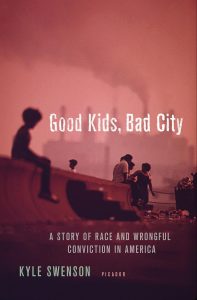Works of Justice is an online series that features content connected to the PEN America Prison and Justice Writing Program, reflecting on the relationship between writing and incarceration, and presenting challenging conversations about criminal justice in the United States.
“ . . . when I first met Kwame, I believed his story generally, but my one reservation was that I was sure the court system must have safety nets in place to catch innocent defendants from falling into the system. I was wrong.”
 Award-winning investigative journalist Kyle Swenson’s debut book, Good Kids, Bad City: A Story of Race and Wrongful Conviction in America, tells the true story of the longest wrongful imprisonment in the United States to end in exoneration.
Award-winning investigative journalist Kyle Swenson’s debut book, Good Kids, Bad City: A Story of Race and Wrongful Conviction in America, tells the true story of the longest wrongful imprisonment in the United States to end in exoneration.
In 1975, three young African-American men—Wiley Bridgeman, Kwame Ajamu, and Rickey Jackson—were accused and convicted of robbing and killing a man outside of a convenience store in Cleveland, Ohio. Their conviction was based on a questionable testimony by a then twelve-year-old Ed Vernon, who in 2014 recanted his statement. It was Swensen’s 2011 article for the Cleveland Scene that produced new evidence and helped reopen the controversial case. Through the stories of Wiley, Kwame, and Rickey, Good Kids, Bad City helps uncover the flawed justice system that wrongfully incarcerated the three young men in prison for almost four decades. It is also a critical exploration of Cleveland’s history as a microcosm of systemic injustices in our society.
In advance of Kyle’s February 27 Works of Justice event at Housing Works Bookstore Cafe, Prison and Justice Writing Program intern Lisa Nishimura asked the investigative journalist some questions:
LISA NISHIMURA: What brought you into the field of criminal justice and, more specifically, to Kwame, Wiley, and Rickey’s cases?
KYLE SWENSON: I have always been interested in criminal justice because I feel the legal system is where so many of the critical issues facing our society collide—issues of economic inequality, housing discrimination, systemic racism, government spending, the influence of the federal government on local municipalities, legacies of violence, etc. The criminal justice system is a doorway into the lives of many Americans who are being impacted by the larger forces in society.
Specifically, with this case, I first heard about Kwame’s situation from an attorney in Cleveland. We had worked on a number of stories together—he was a well-known civil rights lawyer in town—and he reached out to ask if I would be interested in looking into the case. I said yes.
NISHIMURA: What did it take to deeply investigate the case? Can you tell us a bit about the process of writing the book?
SWENSON: There were a number of avenues I went down to investigate this case. Initially, I gathered together all the original trial transcripts, as well as the police files, and compared the various accounts from the state’s main witness, Edward Vernon. Tracking the inconsistencies within these various accounts became the road map to my reporting. From there I found people from the neighborhood who remembered the case, including witnesses who were actually with the three young men when they were supposedly committing the crime. I also focused intensely on the police officers involved, combing through their police files, court records, and newspaper accounts for other allegations of official misconduct against the officers—and I found them.
Also, the research in the book consisted of really diving into the history of Cleveland—I really learned the about my hometown for the first time in an in-depth, historical way.
NISHIMURA: What do you hope that this book will accomplish? How do you see it operating on a micro level—interpersonally, in the lives of Kwame, Wiley, and Rickey, in your own life, and on a macro systems level? What impact do you believe writing and literature can have, more broadly?
SWENSON: On a micro-level, I wanted this book to be a full and detailed account of what happened to these three young men. Who was involved in their wrongful arrest and prosecution? Why they would railroad three innocent men? What kind of civic environment would foster a situation where such an injustice could occur? I believe that in this country, we tend to think about wrongful conviction all wrong—we look at these cases as stand-alone nightmares but fail to conceptualize them as part of a larger systemic problem. We also never look back, examine what went wrong, name names. This book was meant to correct that gap in the collective memory.
On a larger level, I hope this book shakes some of the comfy ideas people have about the reliability of the American criminal justice system. This happened to me—when I first met Kwame, I believed his story generally, but my one reservation was that I was sure the court system must have safety nets in place to catch innocent defendants from falling into the system. I was wrong. I hope the narrative will detonate similar opinions in readers.
NISHIMURA: What actions could create change in the criminal justice system so that others do not experience wrongful conviction the way Kwame, Wiley, and Rickey did?
SWENSON: I believe there are two areas that can impact this issue. The first: In other countries, once a wrongful conviction is discovered, it triggers a fact-finding commission to examine what went wrong. We don’t do this in our country—we simply move forward. This is necessary to correct the system.
Also, the second idea: I truly believe we will not be able to stop wrongful convictions until we hold police and prosecutors responsible for their role in the imprisonment of innocent men and women. Both parties are largely covered with immunity under the law, but unless that is removed and consequences are handed out to the men and women behind these convictions, there will be little incentive on their part to tread carefully.
NISHIMURA: What message about justice do you hope readers walk away with?
SWENSON: I don’t necessarily feel my book is an indictment of the justice system—this is the system we have. I do feel, however, that our system has drifted away from the fundamental values inherent in our democratic founding, including the equal protection of the law. My book points a spotlight at how far we have strayed from those promises, and how far we have to go to get back to a justice system that deserves the name.
Listen to Kyle Swenson in conversation with Albert Samaha February 27, 2019 at Housing Works Bookstore and Cafe for more of Kyle’s thoughts on justice.

